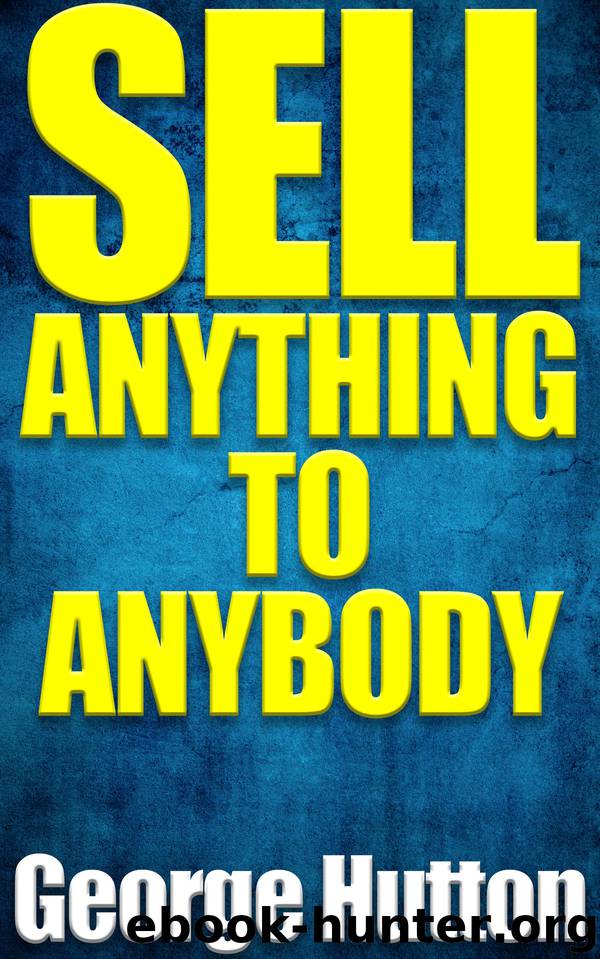Sell Anything To Anybody: The Easiest Way Ever To Make A Fortune in Sales by Hutton George

Author:Hutton, George [Hutton, George]
Language: eng
Format: epub
Published: 2018-07-21T16:00:00+00:00
Either Or
If you’ve tried some of these techniques out, you will have encountered a very common problem. Even when people have an idea of their dreams or fantasies or best-case scenarios, even when they fully believe that you aren’t going to judge them or condemn them or criticize them, they still won’t be able to very accurately or articulately describe what’s inside their heads. Why? Because most of us never spend much time look at our own ideas. This is something very curious about us humans, but it’s something that we’ve got to accept. Most of the well thought out ideas, as they exist in our heads, weren’t really created by us. Most of us are very poor independent thinkers. Most people don’t sit around and carefully construct images of their dreams of fantasies in their minds. Sure, we all have fantasies and dreams. But remember the last time you were really hungry, but just couldn’t decide what to do. This is a very common human experience. To have a strong desire, based on a deep instinct, but not have a very clear idea of how, specifically, you’d like to fulfill that desire. From a structural level, every one of our desires is essentially the same. We have a conscious desire based on one of our instincts (food, sex, companionship, self-expression, need for housing, etc.) but we don’t know how we will fulfill it. When we are hungry, this means wandering around in a food court or a grocery store until we find something that is seems like it will satisfy us enough. This is very similar to how our own desires, as represented inside us, or arranged ordinally. As we wander the supermarket aisles, we are trying to choose possible solutions to our desires the same way. We compare this meal to that meal. And on and on, until we finally choose. One thing that makes this very difficult is that there seems to be an upper limit of choice. For example, in marketing studies, the optimal number of choices is normally between 3 and 5. Beyond that, we have analysis paralysis and we can’t choose. If you knew you wanted some kind of pasta and red sauce dinner, you’d have to choose the pasta, which wouldn't’ be so hard. Then you’d have to choose the sauce, which wouldn’t be so hard, then you’d have to choose the vegetables or meat you’d have to add to the sauce, which wouldn’t be so hard. Each subsequent choice can be narrowed to 3 to 5 choices. Once you’ve got anything down to 3 to 5 choices it’s pretty easy. But not knowing even the kind of meal you want, that’s when we run into problems. But this all falls the ordinal comparison model. We have a raw desire (food, sex, etc.) and we go looking in our external world to satisfy those desires. To the extent our desire is somewhat constrained (e.g. Mexican food, Cheeseburgers, etc.) we’ll have an easy choice. To the extent our desires are unconstrained (e.
Download
This site does not store any files on its server. We only index and link to content provided by other sites. Please contact the content providers to delete copyright contents if any and email us, we'll remove relevant links or contents immediately.
| Advertising | Consumer Behavior |
| Customer Service | Marketing |
| Public Relations | Sales & Selling |
| Search Engine Optimization |
Influence: The Psychology of Persuasion by Robert B. Cialdini(4754)
The Miracle Morning by Hal Elrod(4692)
The Hacking of the American Mind by Robert H. Lustig(4355)
Pre-Suasion: A Revolutionary Way to Influence and Persuade by Robert Cialdini(4196)
Unlabel: Selling You Without Selling Out by Marc Ecko(3639)
Ogilvy on Advertising by David Ogilvy(3584)
Hidden Persuasion: 33 psychological influence techniques in advertising by Marc Andrews & Matthijs van Leeuwen & Rick van Baaren(3536)
Purple Cow by Seth Godin(3178)
Who Can You Trust? by Rachel Botsman(3118)
Kick Ass in College: Highest Rated "How to Study in College" Book | 77 Ninja Study Skills Tips and Career Strategies | Motivational for College Students: A Guerrilla Guide to College Success by Fox Gunnar(3106)
The Marketing Plan Handbook: Develop Big-Picture Marketing Plans for Pennies on the Dollar by Robert W. Bly(3027)
This Is Marketing by Seth Godin(3004)
I Live in the Future & Here's How It Works by Nick Bilton(2975)
The Power of Broke by Daymond John(2953)
The Tipping Point by Malcolm Gladwell(2896)
Building a StoryBrand by Donald Miller(2883)
The 46 Rules of Genius: An Innovator's Guide to Creativity (Voices That Matter) by Marty Neumeier(2828)
Draw to Win: A Crash Course on How to Lead, Sell, and Innovate With Your Visual Mind by Dan Roam(2768)
Market Wizards by Jack D. Schwager(2685)
